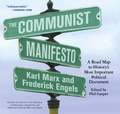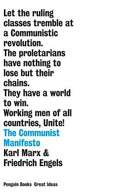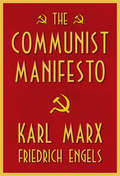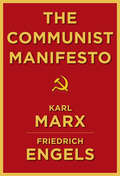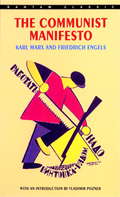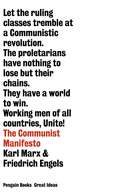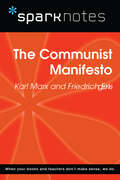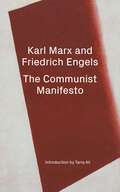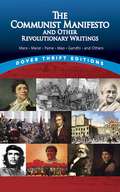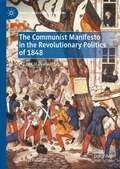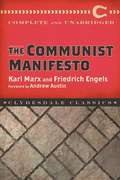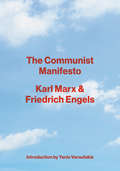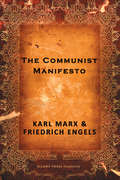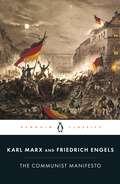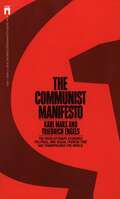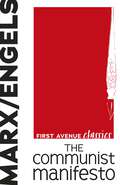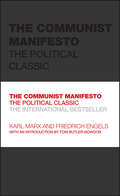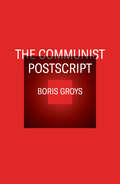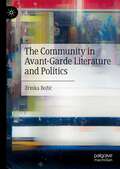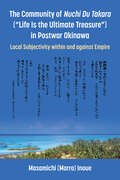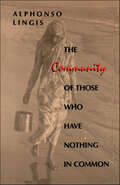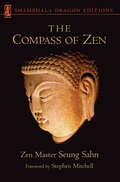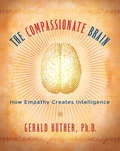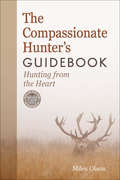- Table View
- List View
The Communist Manifesto
by Karl Marx Frederick Engels Phil Gasper"What is globalization? Here is one of the best answers. It is the 'constant revolutionizing of production' and the 'endless disturbance of all social conditions.' It is 'everlasting uncertainty.' Everything 'fixed and frozen' is 'swept away,' and 'all that is solid melts into air.' Yes, you have read this before. It is from The Communist Manifesto, by Messrs. Marx and Engels."--The New York TimesHere, at last, is an authoritative introduction to history's most important political document, with the full text of The Communist Manifesto by Marx and Engels.This beautifully organized and presented edition of The Communist Manifesto is fully annotated, with clear historical references and explication, additional related texts, and a glossary that will bring the text to life for students, as well as the general reader.Since it was first written in 1848, the Manifesto has been translated into more languages than any other modern text. It has been banned, censored, burned, and declared "dead." But year after year, the text only grows more influential, remaining required reading in courses on philosophy, politics, economics, and history."Apart from Charles Darwin's Origin of Species," notes the Los Angeles Times, the Manifesto "is arguably the most important work of nonfiction written in the 19th century." The Washington Post calls Marx "an astute critic of capitalism." Writing in The New York Times, Columbia University Professor Steven Marcus describes the Manifesto as a "masterpiece" with "enduring insights into social existence."The New Yorker recently described Karl Marx as "The Next Thinker" for our era. This book will show readers why.Phil Gasper is a professor of philosophy at Notre Dame de Namur University in northern California. He writes extensively on politics and the philosophy of science and is a frequent contributor to CounterPunch.
The Communist Manifesto
by Karl Marx Frederick EngelsThe Communist Manifesto, originally titled Manifesto of the Communist Party (German: Manifest der Kommunistischen Partei) is a short 1848 book written by the German Marxist political theorists Karl Marx and Friedrich Engels. It has since been recognized as one of the world's most influential political manuscripts. Commissioned by the Communist League, it laid out the League's purposes and program. It presents an analytical approach to the class struggle (historical and present) and the problems of capitalism, rather than a prediction of communism's potential future forms. <p><p> The book contains Marx and Engels' Marxist theories about the nature of society and politics, that in their own words, "The history of all hitherto existing society is the history of class struggles." It also briefly features their ideas for how the capitalist society of the time would eventually be replaced by socialism, and then eventually communism.
The Communist Manifesto
by Friedrich Engels Karl Marx Gareth Stedman JonesThe perfect books for the true book lover, Penguin's Great Ideas series features twelve more groundbreaking works by some of history's most prodigious thinkers. Each volume is beautifully packaged with a unique type-driven design that highlights the bookmaker's art. Offering great literature in great packages at great prices, this series is ideal for those readers who want to explore and savor the Great Ideas that have shaped our world. The Communist Manifesto changed the face of the twentieth century beyond recognition, inspiring millions to revolution, forming the basis of political systems that still dominate countless lives and continuing to ignite violent debate about class and capitalism today.
The Communist Manifesto
by Friedrich Engels Karl MarxThe Communist Manifesto presents the argument that capitalism is by its very nature exploitative and hence is antithetical to freedom. Written in 1848, it became the blueprint for the communist wave that would sweep Europe. It remains a fascinating read.
The Communist Manifesto
by Friedrich Engels Karl MarxThe Communist Manifesto presents the argument that capitalism is by its very nature exploitative and hence is antithetical to freedom.<P><P> Commissioned by the Communist League and originally published in London (in German as Manifest der Kommunistischen Partei) just as the revolutions of 1848 began to erupt, the Manifesto was later recognised as one of the world's most influential political documents. It presents an analytical approach to the class struggle (historical and then-present) and the problems of capitalism and the capitalist mode of production, rather than a prediction of communism's potential future forms. <P>The Communist Manifesto summarises Marx and Engels' theories about the nature of society and politics, that in their own words, "The history of all hitherto existing society is the history of class struggles". It also briefly features their ideas for how the capitalist society of the time would eventually be replaced by socialism. <P>In 2013 The Communist Manifesto was registered to UNESCO's Memory of the World Programme with the Capital, Volume I.
The Communist Manifesto
by Karl Marx Friedrich Engels"A spectre is haunting Europe - the spectre of Communism." So begins one of history's most important documents, a work of such magnitude that it has forever changed not only the scope of world politics, but indeed the course of human civilization. The Communist Manifesto was written in Friedrich Engels's clear, striking prose and declared the earth-shaking ideas of Karl Marx. Upon publication in 1848, it quickly became the credo of the poor and oppressed who longed for a society "in which the free development of each is the condition for the free development of all."The Communist Manifesto contains the seeds of Marx's more comprehensive philosophy, which continues to inspire influential economic, political, social, and literary theories. But the Manifesto is most valuable as an historical document, one that led to the greatest political upheaveals of the nineteenth and twentieth centuries and to the establishment of the Communist governments that until recently ruled half the globe.This Bantam Classic edition of The Communist Manifesto includes Marx and Engels's historic 1872 and 1882 prefaces, and Engels's notes and prefaces to the 1883 and 1888 editions.
The Communist Manifesto (Penguin Great Ideas)
by Friedrich Engels Karl MarxThroughout history, some books have changed the world. They have transformed the way we see ourselves - and each other. They have inspired debate, dissent, war and revolution. They have enlightened, outraged, provoked and comforted. They have enriched lives - and destroyed them. Now Penguin brings you the works of the great thinkers, pioneers, radicals and visionaries whose ideas shook civilization, and helped make us who we are.
The Communist Manifesto (SparkNotes Philosophy Guide)
by SparkNotesThe Communist Manifesto (SparkNotes Philosophy Guide) Making the reading experience fun! SparkNotes Philosophy Guides are one-stop guides to the great works of philosophy–masterpieces that stand at the foundations of Western thought. Inside each Philosophy Guide you&’ll find insightful overviews of great philosophical works of the Western world.
The Communist Manifesto / The April Theses
by Friedrich Engels Karl Marx V. I. Lenin Ali TarigA new beautiful edition of the Communist Manifesto, combined with Lenin's key revolutionary tract"A spectre is haunting Europe..."The Communist Manifesto is the most influential political book ever written - few others have fundamentally changed the world. After the Russian Revolution it became the key text for radicals the world over. Now, in the wake of a punishing financial crisis and on the centenary of the Revolution that it helped to spark, the book remains both an essential guide to the transformations wrought by capitalism and presents the solution to its inequalities and exploitation.There have been many editions of the Manifesto before, but this is a beautifully presented hardback edition and with one key addition - as this book was instrumental in the Russian Revolution it has been coupled with Lenin's April Theses as an attractive 'flip' book (i.e. turn the book upside down and you have another). Lenin presented his ten directives after his return from exile in 1917, and they are the key program for the revolution that was carried out that year.This landmark edition includes a new introduction by Tariq Ali, showing how the Russian Revolution changed the world and the horizon of political change, and why its ambition is still relevant today.From the Hardcover edition.
The Communist Manifesto and Other Revolutionary Writings: Marx, Marat, Paine, Mao Tse-Tung, Gandhi and Others (Dover Thrift Editions)
by Bob BlaisdellThis concise anthology presents a broad selection of writings by the world's leading revolutionary figures. Spanning three centuries, the works include such milestone documents as the Declaration of Independence (1776), the Declaration of the Rights of Man (1789), and the Communist Manifesto (1848). It also features writings by the Russian revolutionaries Lenin and Trotsky; Marat and Danton of the French Revolution; and selections by Jean-Jacques Rousseau, Emma Goldman, Mohandas Gandhi, Mao Zedong, and other leading figures in revolutionary thought.An essential collection for anyone interested in the issues, ideas, and history of the major revolutions of modern times, this book will prove an enlightening companion to students of this genre. Includes a selection from the Common Core State Standards Initiative: The Declaration of Independence.
The Communist Manifesto in the Revolutionary Politics of 1848: A Critical Evaluation (Marx, Engels, and Marxisms)
by David IrelandThis book examines why, on the eve of the pamphlet’s 175th anniversary, the Communist Manifesto left so faint an imprint on Europe’s most revolutionary year of 1848, when it has had such a huge impact on posterity. The Manifesto that year misread bourgeois intentions, put too much faith in the industrial proletariat, too little in peasants, too much emphasis on the German states, and none on England. Marx and Engels preferred in 1848–9 to focus on the middle-class Neue Rheinische Zeitung, declining to galvanise working-class groups whose leadership they had actively sought. They neglected to return swiftly to the German states in their crucial 1848 ‘March days’. The Manifesto’s programme barely overlapped with contemporary campaigners or comparative pamphleteers, or the replacement Demands of the Communist Party in Germany. The book considers the consequences of Marx opting to write the Manifesto alone in January 1848. It also questions the source and significance of the pamphlet’s most memorialised phrase, ‘the spectre of Communism’, whether it was written for the ‘working men of all countries’ addressed in its finale, and whether Marx and Engels regarded the Manifesto as highly in 1848, as they undoubtedly did in later life.
The Communist Manifesto: (manifesto Of The Communist Party; German: Manifest Der Kommunistischen Partei) (Mobi Classics Ser.)
by Karl Marx Frederich Engels Andrew AustinPackaged in handsome, affordable trade editions, Clydesdale Classics is a new series of essential works. From the musings of intellectuals such as Thomas Paine in Common Sense to the striking personal narrative of Harriet Jacobs in Incidents in the Life of a Slave Girl, this new series is a comprehensive collection of our intellectual history through the words of the exceptional few.Originally published as a political pamphlet in 1848, amidst the revolutions in Europe, The Communist Manifesto documents Karl Marx and Friedrich Engels’s theories on society and politics. It does so by defining the state of the class system in contemporary Europe—in which a larger, lower class is controlled and oppressed by a tyrannical, oppressive upper class. The Manifesto argues that, at some point in history, the lower class will inevitably realize their potential and exploitation and subsequently revolt. Once this occurs, Marx and Engels argue, there will be an uprising among proletariats that shifts political and economic power, ultimately resulting in the dismantling of class systems and capitalism. Additionally, in the Manifesto, Marx and Engels also predict the future state of the global economy and discuss their viewpoints on private property, while also addressing many other topics pertinent to today’s world.Although written nearly 170 years ago, The Communist Manifesto is still widely read and cited. Amid the current turmoil between social classes and the societies of the world, its revolutionary prose and ideas can still yield ripe food for thought.
The Communist Manifesto: (manifesto Of The Communist Party; German: Manifest Der Kommunistischen Partei) (Mobi Classics Ser.)
by Friedrich Engels Karl MarxThe Communist Manifesto was first published in London in 1848 by two young men in their twenties, Karl Marx and Friedrich Engels, and its impact reverberated across the globe and through the next century. Foreshadowing globalization 150 years before it happened, the Manifesto brims with prescient insights into the crisis facing capitalism today. It is an essential read for anyone seeking to understand the modern political landscape. This edition includes a new introduction by the bestselling author of And the Weak Suffer What They Must? and Talking to My Daughter About the Economy, Yanis Varoufakis.
The Communist Manifesto: The Authorized English Translation, Edited and Annotated by Friedrich Engels
by Friedrich Engels Karl MarxOne of the world's most influential political treatises, The Communist Manifesto outlines the base principles of communism as they relate to class struggle, economics, and politics.Originally published in 1848 as the Manifesto of the Communist Party, The Communist Manifesto was foundational to the development of modern communism and socialism.
The Communist Manifesto: The Communist Manifesto
by Karl MarxAll that is solid melts into air, all that is holy is profaned …Working men of all countries, Unite! This book truly changed the world, inspiring millions to revolution. Over 150 years after its publication, Marx and Engels' Communist Manifesto continues to inspire and provoke students, activists and citizens. The principles embodied within in it lie at the heart of thousands of academic and literary works. It is the starting point for people who refuse to accept that capitalism represents the final a...
The Communist Manifesto: The Communist Manifesto (First Avenue Classics ™)
by Friedrich Engels Karl MarxThe Communist Manifesto is one of the most influential political books in the world, despite being over one hundred years old. German philosophers Karl Marx and Friedrich Engels authored the manuscript at the beginning of the 1848 revolutions that swept across Europe. The book outlines Communist theories about class struggle, the problems of capitalism, and predicts the rise of the working class (referred to as the proletariat) against the bourgeois that will ultimately end class society. Marx and Engels' theories increased in prevalence during the twentieth century when Communist rulers governed much of the world's population. This is an unabridged version of Samuel Moore's 1888 English translation.
The Communist Manifesto: The Political Classic (Capstone Classics)
by Friedrich Engels Karl MarxDISCOVER THE WORK THAT LAUNCHED REVOLUTIONS AROUND THE WORLD Although it was published in 1848, The Communist Manifesto is as controversial and provocative as ever. Its stirring and poetic language helped spread Marx and Engels' socialist message far and wide, unleashing a century of political revolution. In an age of great inequality, the Manifesto's message of an exploited and suffering working class that must rise up and claim the means of production and wealth continues to resonate. This deluxe edition features an insightful introduction from Tom Butler-Bowdon which explains how the text came to be written, and why it remains popular.
The Communist Postscript
by Boris Groys Thomas FordSince Plato, philosophers have dreamed of establishing a rational state ruled through the power of language. In this radical and disturbing account of Soviet philosophy, Boris Groys argues that communism shares that dream and is best understood as an attempt to replace financial with linguistic bonds as the cement uniting society. The transformative power of language, the medium of equality, is the key to any new communist revolution.From the Hardcover edition.
The Community in Avant-Garde Literature and Politics
by Zrinka BožićThis book rethinks the concept of community taking Jean-Luc Nancy’s influential essay “La communauté désoeuvrée” as its starting point, tracing subsequent scholarship on community and adding new insights on avant-garde aesthetics and politics. Extensively exploring the communitarian dimension of avant-garde aesthetics and politics (focusing on artistic groups, intellectual circles and theoretical collectives), the author aims to bring literature and art into a philosophical examination of the paradoxical and complex idea of community.
The Community of Nuchi Du Takara ("Life Is the Ultimate Treasure") in Postwar Okinawa: Local Subjectivity within and against Empire
by Masamichi (Marro) InoueAgainst the background of the prolonged US military presence in post–World War II Okinawa, The Community of Nuchi Du Takara (“Life Is the Ultimate Treasure”) in Postwar Okinawa explores the conflict between Okinawa and the US-Japan alliance. Developing the local notion of nuchi du takara into an analytical concept, Inoue examines how Okinawan activists, artists, writers, and other social actors have resisted US military presence, particularly the planned construction of a new military facility in northern Okinawa. The concept of nuchi du takara also helps Inoue explore complex negotiations Okinawa has had with Washington and Tokyo beyond resistance and protest, a process that involves developing a local communal capacity to embrace diverse and often contradictory attitudes toward the US military. Inoue’s grounded investigation underscores the possibility of small yet significant, incremental social changes from below, a possibility that ultimately points toward the World Republic—an international politics built upon peace, democracy, and shared affluence—against the sovereignty of global capitalism.
The Community of Those Who Have Nothing in Common (Studies in Continental Thought)
by Alphonso Lingis" . . . thought-provoking and meditative, Lingis's work is above all touching, and offers a refreshingly idiosyncratic antidote to the idle talk that so often passes for philosophical writing." —Radical Philosophy" . . . striking for the clarity and singularity of its styles and voices as well as for the compelling measure of genuine philosophic originality which it contributes to questions of community and (its) communication." —Research in PhenomenologyArticulating the author's journeys and personal experiences in the idiom of contemporary continental thought, Alphonso Lingis launches a devastating critique, pointing up the myopia of Western rationalism. Here Lingis raises issues of undeniable urgency.
The Compass of Zen
by Seung SahnThe Compass of Zen is a simple, exhaustive--and often hilarious--presentation of the essence of Zen by a modern Zen Master of considerable renown. In his many years of teaching throughout the world, the Korean-born Zen Master Seung Sahn has become known for his ability to cut to the heart of Buddhist teaching in a way that is strikingly clear, yet free of esoteric and academic language. In this book, based largely on his talks, he presents the basic teachings of Buddhism and Zen in a way that is wonderfully accessible for beginners--yet so rich with stories, insights, and personal experiences that long-time meditation students will also find it a source of inspiration and a resource for study.
The Compassionate Brain: A Revolutionary Guide to Developing Your Intelligence to Its Full Potential
by Gerald HütherHere is the ultimate explanation of the brain for everyone who thinks: a guide to how the brain works, how our brains came to operate the way they do, and, most important, how to use your precious gray matter to its full capacity. The brain, according to current research, is not some kind of automatic machine that works independently of its user. In fact, the circuitry of the brain actually changes according to how one uses it. Our brains are continuously developing new capacities and refinements--or losing them, depending upon how we use them. Gerald Hüther takes us on a fascinating tour of the brain's development--from one-celled organisms to worms, moles, apes, and on to us humans--showing how we truly are what we think: our behavior directly affects our brain capacity. And the behavior that promotes the fullest development of the brain is behavior that balances emotion and intellect, dependence and autonomy, openness and focus, and ultimately expresses itself in such virtues as truthfulness, considerateness, sincerity, humility, and love. Hüther's user's-manual approach is humorous and engaging, with a minimum of technical language, yet the book's message is profound: the fundamental nature of our brains and nervous systems naturally leads to our continued growth in intelligence and humanity.
The Compassionate Hunter's Guidebook: Hunting from the Heart (Mother Earth News Books for Wiser Living)
by Miles Olson&“This book reminds us that hunting provides sustenance for both body and soul, and that mindful eating requires both respect and gratitude.&”—Tovar Cerulli, author of The Mindful Carnivore Wild meat, hunted in a responsible way, is one of the most healthful, sustainable foods possible. Depending on how it is done, hunting can be as local, intimate and humane as it gets. And aside from this, it demands the hunter enter a world of awareness, wildness, life and death that as a culture we have lost connection to. The Compassionate Hunter&’s Guidebook is for those who come to the act of hunting with pure intentions, motivated by a desire for healthy food that comes directly from the land where they live. This practical manual suggests that hunting is not a &“sport&” and the animals whose lives are taken are not &“game.&” It combines a deep, philosophical exploration of the ethics of killing with detailed instructions on every step of the process including: Understanding your preyTools, techniques and preparationThe act of the huntFrom forest to table—processing, preserving and preparing your kill. A unique and comprehensive, fully-illustrated guide to the complexity, ethics and spirit of the hunt, The Compassionate Hunter is a must-read for beginning and experienced hunters alike. It will appeal to anyone who wishes to delve more deeply into the complex, humbling and ultimately profound reality of our relationship with the food that nourishes us. &“Arguably the food that most closely approximates our nutritional needs, wild game assumes a sacred and satiating beauty in The Compassionate Hunter.&”—Joel Salatin, farmer and author of Pastured Poultry Profits
